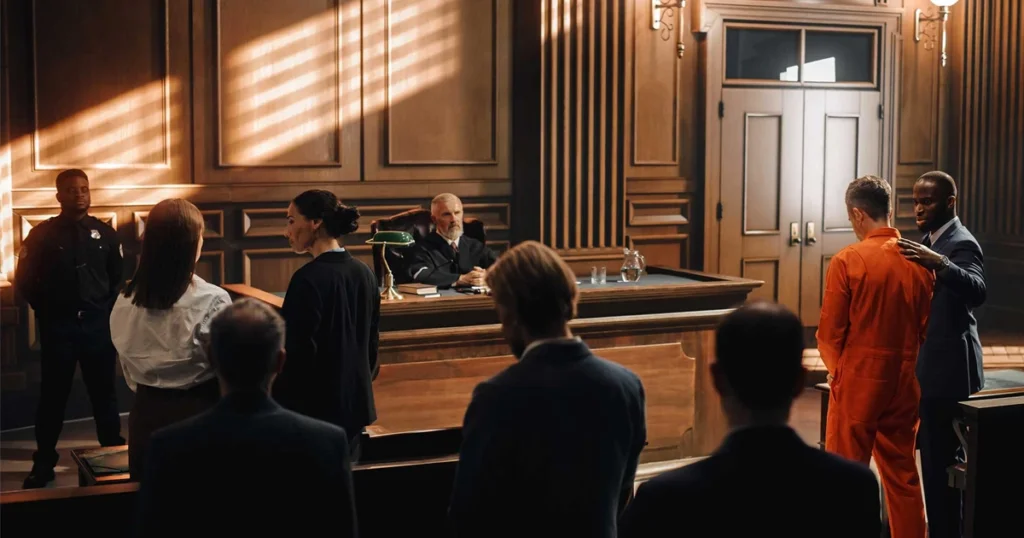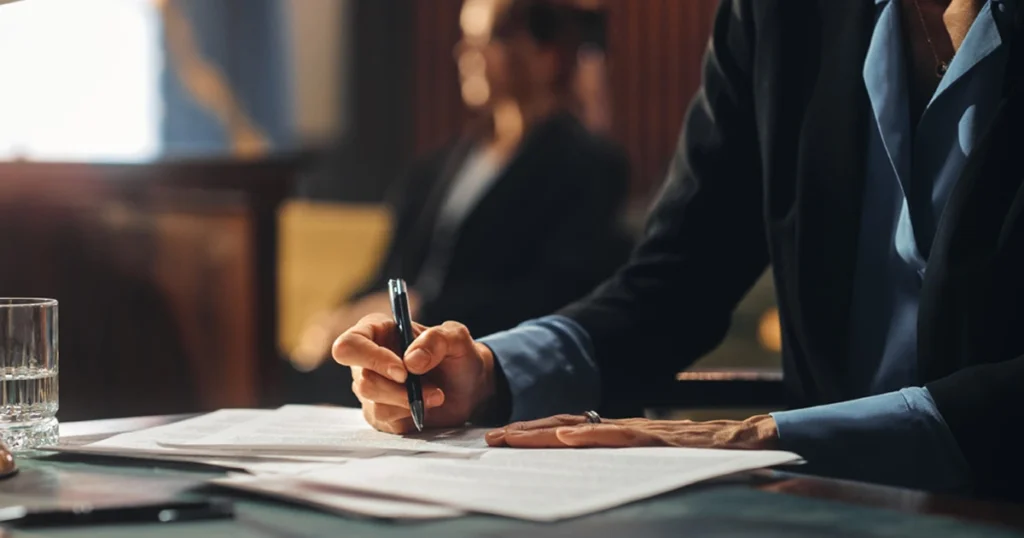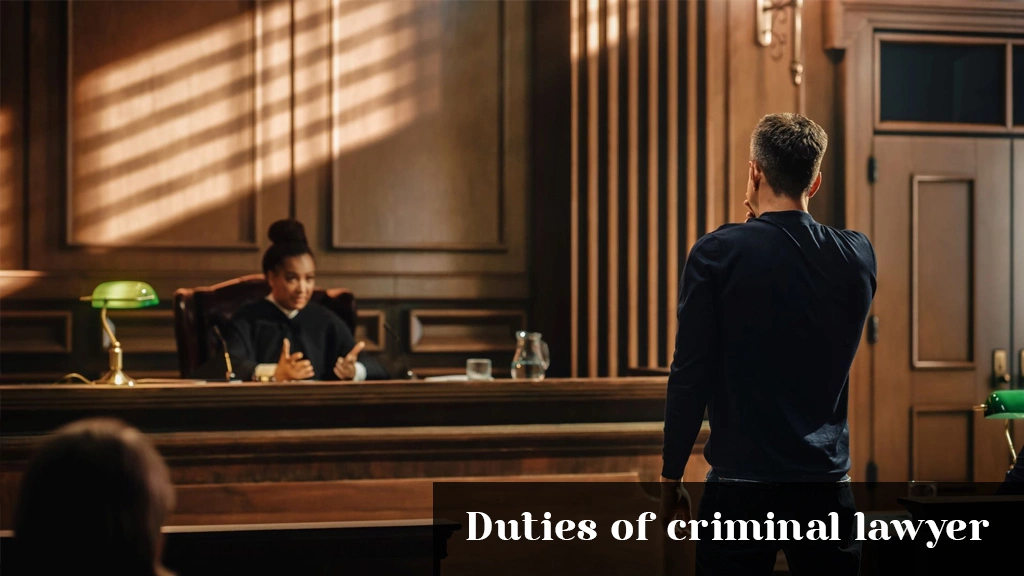Understanding the Duties of a Criminal Lawyer
Criminal lawyers play a crucial role in the legal system, representing individuals accused of crimes and ensuring their rights are protected. The duties of a criminal lawyer extend far beyond arguing in court; they are responsible for providing guidance, building defense strategies, and negotiating on behalf of their clients. In this article, we’ll explore the essential duties of a criminal lawyer and how they help clients navigate the complex world of criminal law.
Who is a Criminal Lawyer?

A criminal lawyer is a legal professional specializing in criminal law. They represent clients facing criminal charges, from minor offenses to serious crimes. Their goal is to either prove their client’s innocence or secure the best possible outcome in cases of guilt. Criminal lawyers work on both the defense and prosecution sides, although this article focuses on the duties of criminal defense lawyers.
Primary Duties of a Criminal Lawyer
The duties of a criminal lawyer are extensive, and each case requires a customized approach. However, there are common responsibilities that most criminal lawyers perform throughout their careers.
1.Providing Legal Advice
One of the primary duties of a criminal lawyer is to offer legal advice to clients. This advice can include helping clients understand the charges against them, explaining possible outcomes, and discussing potential defense strategies. Criminal lawyers are responsible for ensuring clients fully understand their rights and options, especially as the case progresses.
–Explaining Legal Rights: Criminal lawyers inform clients about their rights during the investigation and trial process, such as the right to remain silent, the right to a fair trial, and protection against self-incrimination.
-Assessing Case Viability: By examining the facts, a criminal lawyer can determine whether the case has a strong defense or if it’s more likely to end in a plea agreement.
2.Conducting Investigations and Gathering Evidence
A significant part of a criminal lawyer’s duties involves investigating the case and collecting evidence. They often work with private investigators and other professionals to gather all necessary information, including witness statements, physical evidence, and expert analysis.
-Interviewing Witnesses: Criminal lawyers locate and interview witnesses who may provide helpful information to strengthen the defense.
-Reviewing Police Reports and Evidence: They carefully examine police records, physical evidence, and any other documentation that could impact the case. This process helps them identify inconsistencies or errors in the prosecution’s case.
–Collecting Expert Testimonies: Criminal lawyers often work with experts, like forensic scientists or psychologists, who can testify on behalf of the client or provide evidence supporting the defense.
3.Developing a Defense Strategy
Building a strong defense strategy is central to a criminal lawyer’s role. The strategy is based on the lawyer’s knowledge of criminal law, the facts of the case, and the client’s circumstances. A well-crafted defense strategy can significantly impact the outcome of the case.
-Analyzing the Prosecution’s Case: Criminal lawyers study the prosecution’s evidence, looking for weaknesses, inconsistencies, or any violations of legal procedures.
–Presenting Alternative Explanations: In some cases, lawyers create alternate narratives to cast doubt on the prosecution’s version of events, helping to strengthen the defense.
–Deciding on Legal Motions: They may file immediate motions to dismiss charges, suppress evidence, or request other favorable rulings. This strategy helps in shaping the trial process and potentially improving the client’s chances of a favorable outcome.
4.Representing Clients in Court
When cases go to trial, one of the most visible duties of a criminal lawyer is representing their client in court. They are responsible for presenting arguments, questioning witnesses, and challenging the prosecution’s evidence.
-Opening and Closing Statements: Criminal lawyers prepare and deliver opening and closing statements to set the stage for their defense and summarize their arguments.
-Cross-Examining Witnesses: During the trial, they cross-examine the prosecution’s witnesses, aiming to weaken their testimony or reveal inconsistencies.
-Presenting Defense Evidence: Criminal lawyers introduce evidence and call witnesses to the stand to support the defense and raise doubt about the prosecution’s case.
5.Negotiating Plea Deals
In many criminal cases, reaching a plea agreement is a realistic and beneficial outcome for both parties. A significant duty of a criminal lawyer is to negotiate favorable plea deals when appropriate. This can lead to reduced charges or lighter sentences for the client.
–Advising on Plea Options: Criminal lawyers assess the strengths and weaknesses of the case to advise clients on whether a plea deal is a wise choice.
–Negotiating with Prosecutors: They negotiate with the prosecution to secure the most favorable terms possible, such as reduced charges, lesser penalties, or alternative sentencing.
–Explaining the Consequences: Before accepting a plea deal, the lawyer ensures the client understands the terms and long-term implications of the agreement.
Additional Duties and Responsibilities

1.Filing Legal Documents
Criminal lawyers handle a wide range of paperwork, including filing legal motions, subpoenas, and evidence requests. Timely filing and accurate documentation are essential for maintaining a smooth legal process. Missing a deadline or filing the wrong document can lead to complications, so criminal lawyers must stay organized and detail-oriented.
2.Maintaining Confidentiality
Confidentiality is one of the core duties of a criminal lawyer. Attorney-client privilege ensures that all information shared between the lawyer and client remains private. Criminal lawyers must uphold this privilege to build trust and allow clients to be open and honest about their cases.
3.Advising Clients on Behavior and Court Etiquette
The way clients present themselves and behave in court can influence the judge, jury, and overall case outcome. Criminal lawyers often coach clients on appropriate court conduct, how to answer questions, and how to dress. This guidance helps clients make a positive impression, which can affect the case’s trajectory.
4.Staying Informed of Legal Changes
Criminal law is constantly changing. New laws, court rulings, and legal precedents can impact cases and change defense strategies. Criminal lawyers have a duty to stay updated on the latest legal developments to provide their clients with accurate and relevant advice. Continuous learning through seminars, courses, and legal publications is often part of a criminal lawyer’s professional commitment.
5.Providing Emotional Support
Facing criminal charges can be emotionally taxing, and criminal lawyers often act as a source of support for their clients. They offer reassurance, address concerns, and provide realistic expectations. Although they are not counselors, their support can make the legal process less overwhelming for clients.
Conclusion
The duties of a criminal lawyer are too many, everything from providing legal advice to representing clients in court. They investigate cases, build defense strategies, and negotiate plea deals—all while upholding confidentiality and offering support. For anyone facing criminal charges, a skilled criminal lawyer is essential to navigating the legal system and achieving the best possible outcome. By fulfilling these duties with dedication and expertise, criminal lawyers play a vital role in upholding justice and protecting the rights of their clients.

